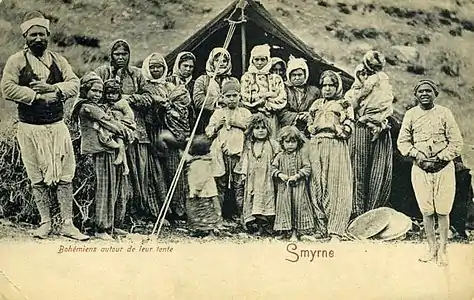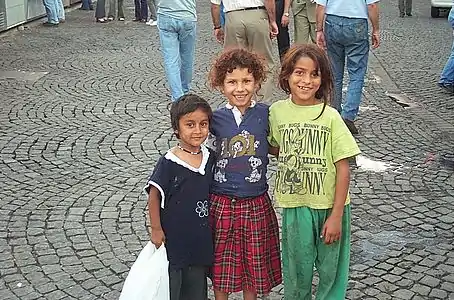Romani people in Turkey
The Romani people in Turkey (Turkish: Türkiye'deki Romanlar), are Sunni muslims who speak Turkish as their first language and take the Turkish culture. The majority group are the Şoparlar, who live in East Thrace. Other Romanlar live in Istanbul and İzmir Province.
| Total population | |
|---|---|
| at least 500,000-5,000,000 | |
| Regions with significant populations | |
| Istanbul (Sulukule), East Thrace/Edirne, Marmara Region, Aegean Region, İzmir Province | |
| Languages | |
| Balkan Romani, Turkish | |
| Religion | |
| Sunni Islam, Sufism |
There are officially about 500,000 Romani in Turkey.[1][2][3][4]
History
Origin
The Romani people in Turkey originate from the Indian subcontinent,[5][6][7][8][9][10] presumably from Gujarat, Sindh[9][10] Punjab, Malabar Coast and Bengal.[9]
The linguistic evidence has indisputably shown that roots of Romani language lie in India: The language has grammatical characteristics of Indian languages and shares with them a big part of the basic lexicon, for example, body parts or daily routines.[11]
More exactly, Romani shares the basic lexicon with Hindi and Punjabi. It shares many phonetic features with Marwari, while its grammar is closest to Bengali.[12]
Genetic findings in 2012 suggest the Romani originated in Coastal India and migrated at 1st Century AD - 2nd AD in waves to Egypt (Roman province)[6][7][13] But, the majority of the Romany People in Turkey, have Turkish Ancestor's too, because they intermarried since the Ottoman time, with Turks. So they belongend to different Haplogroups.
In February 2016, during the International Roma Conference, the Indian Minister of External Affairs stated that the people of the Roma community were children of India. The conference ended with a recommendation to the Government of India to recognize the Roma community spread across 30 countries as a part of the Indian diaspora.[14]
Migration to Turkey
There are records of the presence of the Romani people from AD 800 in Thrace, known in Greek as Athinganoi and in Turkish as Çingene. The Romanlar in Turkey have their own oral tradition, according to which their Ancestors, once came as Traders from different parts of the Indian subcontinent, at the time of the Indo-Roman trade relations, to Egypt (Roman province), and settled around the Red Sea coast. From Egypt, they went with the Umayyad Arabs Warriors as Sutler to Anatolia. After the Battle of Akroinon, they settled there. Sulukule in Istanbul is the oldest Romani settlement in Europe, recorded in 1054. With the expansion of the Ottoman Empire, Romani settled in Rumelia (southeastern Europe) under Ottoman rule. The name Roman/Romanlar came from the Turkish Doğu Roman İmparatorluğu (eastern Roman empire). The majority of the Romani people in Turkey live in East Thrace, Marmara Region and Aegean Region. Uniquely in Ottoman history, the Muslim Romani people were given their own sanjak, or province, the Çingene Sanjak. Romani people in Turkey speak Turkish as their first language, and no longer use Romani. They often marry non-Romani.
The descendants of the Ottoman Romani today are known as Muslim Roma. They are of Sunni Islamic faith of Hanafi madhab, and practise male Khitan (circumcision). In Edirne, the Kakava festival is held every year.[15]
Legal status
In modern Turkey, Xoraxane Romani do not have a legal status of ethnic minority because they are traditionally adherents of the Islamic faith, adherents of which, regardless of ethnicity or race, are considered part of the ethnic majority in Turkey. This goes as far back as the Treaty of Lausanne (1923), in which Section III "Protection of Minorities" put an emphasis on non-Muslim minorities.[16]
In popular culture
A group of Turkish Romani appears in the 16th century Ottoman Constantinople of the video game Assassin's Creed: Revelations.
Gallery
Notable people
- Sibel Can, Turkish folk pop and classical music singer
- Didem, Turkish belly dancer, model and singer
- Kibariye, Turkish Arabesque-pop singer
- Özcan Purçu, Turkish politician
- Hüsnü Şenlendirici, Turkish musician
- Selim Sesler, Turkish clarinet virtuoso of Romani heritage
- Ankaralı Turgut, Turkish musician
- Rafet el Roman, Turkish Popstar
References
- "UNHCR - Document Not Found". Archived from the original on 2012-10-10. Retrieved 2014-06-17.
- Schleifer, Yigal (21 July 2005). "Roma Rights Organizations Work to Ease Prejudice in Turkey". Eurasianet.org. Retrieved 15 December 2017.
- "Archived copy". Archived from the original on 2009-07-29. Retrieved 2010-02-15.CS1 maint: archived copy as title (link)
- "Archived copy". Archived from the original on 2012-10-20. Retrieved 2010-03-24.CS1 maint: archived copy as title (link)
- Hancock, Ian F. (2005) [2002]. We are the Romani People. Univ of Hertfordshire Press. p. 70. ISBN 978-1-902806-19-8: ‘While a nine century removal from India has diluted Indian biological connection to the extent that for some Romani groups, it may be hardly representative today, Sarren (1976:72) concluded that we still remain together, genetically, Asian rather than European’
- Mendizabal, Isabel (6 December 2012). "Reconstructing the Population History of European Romani from Genome-wide Data". Current Biology. 22 (24): 2342–2349. doi:10.1016/j.cub.2012.10.039. PMID 23219723.
- Sindya N. Bhanoo (11 December 2012). "Genomic Study Traces Roma to Northern India". The New York Times.
- Current Biology.
- K. Meira Goldberg; Ninotchka Devorah Bennahum; Michelle Heffner Hayes (2015-10-06). Flamenco on the Global Stage: Historical, Critical and Theoretical Perspectives. p. 50. ISBN 9780786494705. Retrieved 2016-05-21.
- Simon Broughton; Mark Ellingham; Richard Trillo (1999). World Music: Africa, Europe and the Middle East. Rough Guides. p. 147. ISBN 9781858286358. Retrieved 2016-05-21.
Roma Rajastan Penjab.
- Šebková, Hana; Žlnayová, Edita (1998), Nástin mluvnice slovenské romštiny (pro pedagogické účely) (PDF), Ústí nad Labem: Pedagogická fakulta Univerzity J. E. Purkyně v Ústí nad Labem, p. 4, ISBN 978-80-7044-205-0, archived from the original (PDF) on 2016-03-04
- Hübschmannová, Milena (1995). "Romaňi čhib – romština: Několik základních informací o romském jazyku". Bulletin Muzea Romské Kultury. Brno (4/1995).
Zatímco romská lexika je bližší hindštině, marvárštině, pandžábštině atd., v gramatické sféře nacházíme mnoho shod s východoindickým jazykem, s bengálštinou.
- "5 Intriguing Facts About the Roma". Live Science.
- "Can Romas be part of Indian diaspora?". Khaleejtimes.com. 29 February 2016. Retrieved 4 March 2016.
- Elena Marushiakova, Veselin Popov (2001) "Gypsies in the Ottoman Empire", ISBN 1902806026University of Hertfordshire Press
- Original: Елена Марушиакова, Веселин Попов (2000) "Циганите в Османската империя". Литавра, София (Litavra Publishers, Sofia).(in Bulgarian)
- "Treaty of Lausanne - World War I Document Archive". Lib.byu.edu. Retrieved 15 December 2017.
External links
![]() Media related to Romani people in Turkey at Wikimedia Commons
Media related to Romani people in Turkey at Wikimedia Commons


.JPG.webp)
.JPG.webp)
